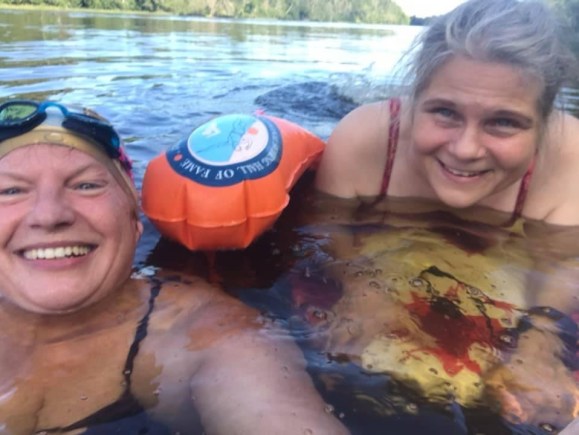That advice came from a session on safety when open water swimming I attended this week. The session was organized by the Rideau Speedeaus, an Ottawa swim club, and there were three presenters.
Chris Wagg has been with the City of Ottawa as a lifeguard and trainer for 35 years. She started out with some drowning statistics for Canada. Next up was Nadine Bennett, a well-known open water and cold water swimmer in Ottawa, who blogs at https://www.wildbigswim.com/. The last speaker was Jeff Mackwood, a lifeguard and the person who set up the Swim Angel program for Ottawa’s 3 km Bring on the Bay swim, which has made it very accessible to those with disabilities, recovering from injury, or nervous about open water swimming.
On average, there are about 500 drownings a year in Canada, with 64% in May to September, 64% in lakes or rivers, and over 60% when swimming alone. The percentage of drownings among middle aged and older people swimming alone is much higher. Obviously, not all of these drownings are among open water swimmers, but it was a good jumping off point for some basic swim safety when swimming outdoors.
- Swim with a buddy. If you can’t then at a minimum let people know where exactly where you will be swimming and when you expect to be back.
- Medical emergencies are more frequent as you get older – have a buddy who can call for help, loan you a float, or just coach you back to shore.
- Make yourself as visible as possible in the water. Wear a brightly coloured swim cap and a tow float. If available to you, especially for longer swims or where there might be boats, having a kayaker to go alongside is even better. If you are swimming early in the morning or late in the evening, invest in some lights you can attach to your wrist and swim goggles
- Tow floats are not official flotation devices, but they do float, so you can use them to rest on. They are also good for holding snacks, drinks, your car keys, phone and other valuables (be sure to put them in a waterproof bag just in case the float leaks). Write your name and a phone number on the float, in case of an emergency.
- If you don’t have a tow float, tie a rope to a pool noodle. It won’t hold your keys, but it will make you visible and you can rest on it in the water.
- If you are new to swimming in open water, or out of practice, start out easy. Do short loops. Stay close to shore. Stop for a rest or snack as needed, then go back in if you are ready. If you are nervous or out of shape, find a supervised beach and swim along the buoy lines.
- Learn to breathe regularly even when there are waves (bilateral breathing is a really useful skill). Also practice swimming in a straight line by picking a target, then peeking up every few strokes with “alligator eyes” just barely out of the water to make sure you are still heading in the right direction.
- Listen to your body. Especially if you are going in the shoulder seasons of May or late Fall, pay attention to your breathing and heart rate, and whether you are losing the ability to move easily in the water because you are cold. Make sure you have a plan to get out and changed into warm dry clothes quickly. You may experience “after drop”, shivering as the blood starts circulating. Wait until that has passed before trying to drive home.
- Pay attention to the weather and be prepared to get out quickly if a storm rolls in. Swimming in the fog or dark can be dangerous. This is what can earn you that Darwin Award.
- Above all, have fun. Practice some drills. Do other strokes than freestyle. Take pictures. Admire the scenery. Revel in the freedom of being in a wide open space with glorious water all around.

Diane Harper is a long-time open water swimmer from Ottawa. She isn’t fast, but she has a lot of fun.
2 thoughts on “Swimming Outdoors – Don’t Win a Darwin Award!”
Comments are closed.